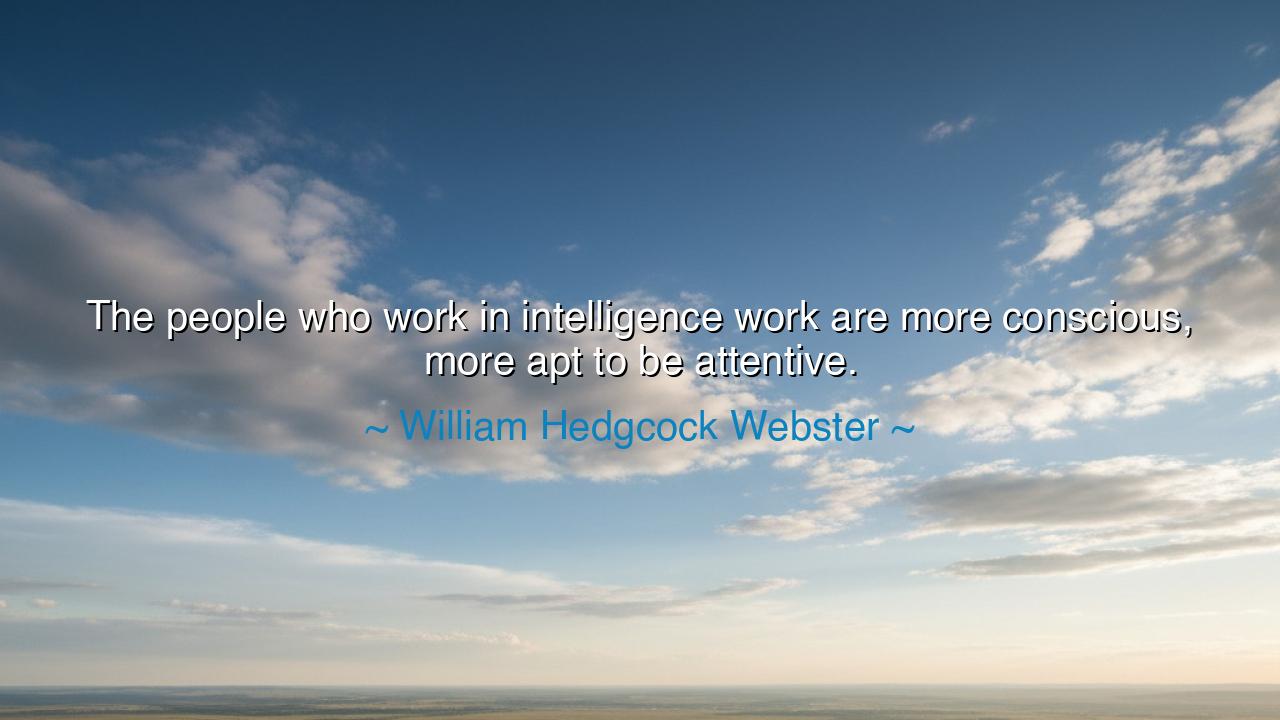
The people who work in intelligence work are more conscious, more






In the shadowed realm of intelligence, where the line between knowledge and ignorance can determine the fate of nations, there exists a unique breed of individuals who possess an extraordinary capacity to observe, listen, and understand the world around them. William Hedgcock Webster speaks to this rare quality when he says, “The people who work in intelligence work are more conscious, more apt to be attentive.” These words carry the weight of profound insight into the nature of those who devote themselves to the service of security and information. Intelligence work is not merely about gathering data—it is about developing a heightened sense of awareness, a sharpness of mind and spirit that allows one to perceive the world in a way few others can.
In the ancient world, those who held positions of wisdom and power were often tasked with the ability to see beyond the obvious. Take, for example, the role of counselors in the courts of kings, such as the wise Advisor in King Solomon’s court, who was known for his profound ability to discern hidden truths. His role was not merely to speak, but to listen and observe, to understand the forces that shaped the world around him, and to provide counsel based on awareness of both the seen and unseen. In the same vein, those who work in intelligence must possess this sharpness of perception, always attuned to the smallest of details that might hold the key to understanding the larger picture. Webster’s words highlight the vigilance and attentiveness required of such individuals—traits that transcend mere knowledge, turning them into guardians of truth.
The art of attentiveness was not merely the domain of advisors or royal counselors, but also of warriors. Take, for example, the legendary Spartan warriors of ancient Greece, whose famous training was built around the concept of alertness to their environment. They were taught to observe every change in the wind, every movement of the enemy, every shift in the battlefield, and to act based on their keen sense of awareness. The Spartans were not just fighters, but observers—always prepared, always attentive to the subtle cues of the world around them. Webster’s insight into the intelligence world reflects the same discipline and awareness that the Spartans embodied on the battlefield: the ability to see what others might overlook and to act swiftly based on that knowledge.
Consider the story of Sherlock Holmes, the famous detective created by Sir Arthur Conan Doyle. Holmes was not a man of brute strength or overwhelming influence, but a man of acute perception. His ability to observe the smallest details—such as a footprint, a subtle change in tone, or the faintest odor—allowed him to solve mysteries that others could not. Holmes’ intelligence was not just based on the information he gathered, but on his constant vigilance and his ability to connect seemingly insignificant details. Like those in intelligence work, Holmes was deeply conscious of the world around him, and his success came not from being informed, but from being attentive to the world in ways others were not. His attentiveness became his greatest weapon, just as it is for those who work in the intelligence world.
The lesson that Webster’s words impart is one of mindfulness and awareness. In our own lives, we can all learn from the vigilance of intelligence professionals and the ancient figures who were masters of observation. In a world increasingly filled with distractions, we must train ourselves to be attentive to the details that matter most, whether in our work, our relationships, or our personal growth. Just as a wise counselor listens to the nuances of a king’s request, or a warrior watches the battlefield with a discerning eye, we too must cultivate the ability to focus on the critical elements in our own lives. It is not enough to simply have knowledge; we must also be aware of how that knowledge impacts our decisions and actions.
In practical terms, attentiveness means being present in the moment. It means listening deeply, observing keenly, and acting with intent. It means recognizing the subtle signals and shifts in our environments that can often reveal more than the loud, obvious ones. Whether you are working on a project, making a decision, or building a relationship, the ability to remain attentive and aware will allow you to see patterns and connections that others might miss. Like the intelligence professionals, you will develop a deeper understanding of the world around you, and this understanding will empower you to make more informed, wise, and effective decisions.
Finally, let us take this lesson of attentiveness into the heart of our own endeavors. Whether we are seeking success in our personal lives or striving to create change in the world, let us approach each task with the same diligence and awareness that those in the intelligence world, or the wise counselors of ancient times, have shown. Let us not allow distractions to dull our perceptions or silence the subtle voices of truth that can guide us. Like Webster’s intelligence professionals, let us strive to be attentive to the details, knowing that it is through this vigilant awareness that we will unlock the greatest insights and find the wisdom we need to shape our lives and futures.






AAdministratorAdministrator
Welcome, honored guests. Please leave a comment, we will respond soon